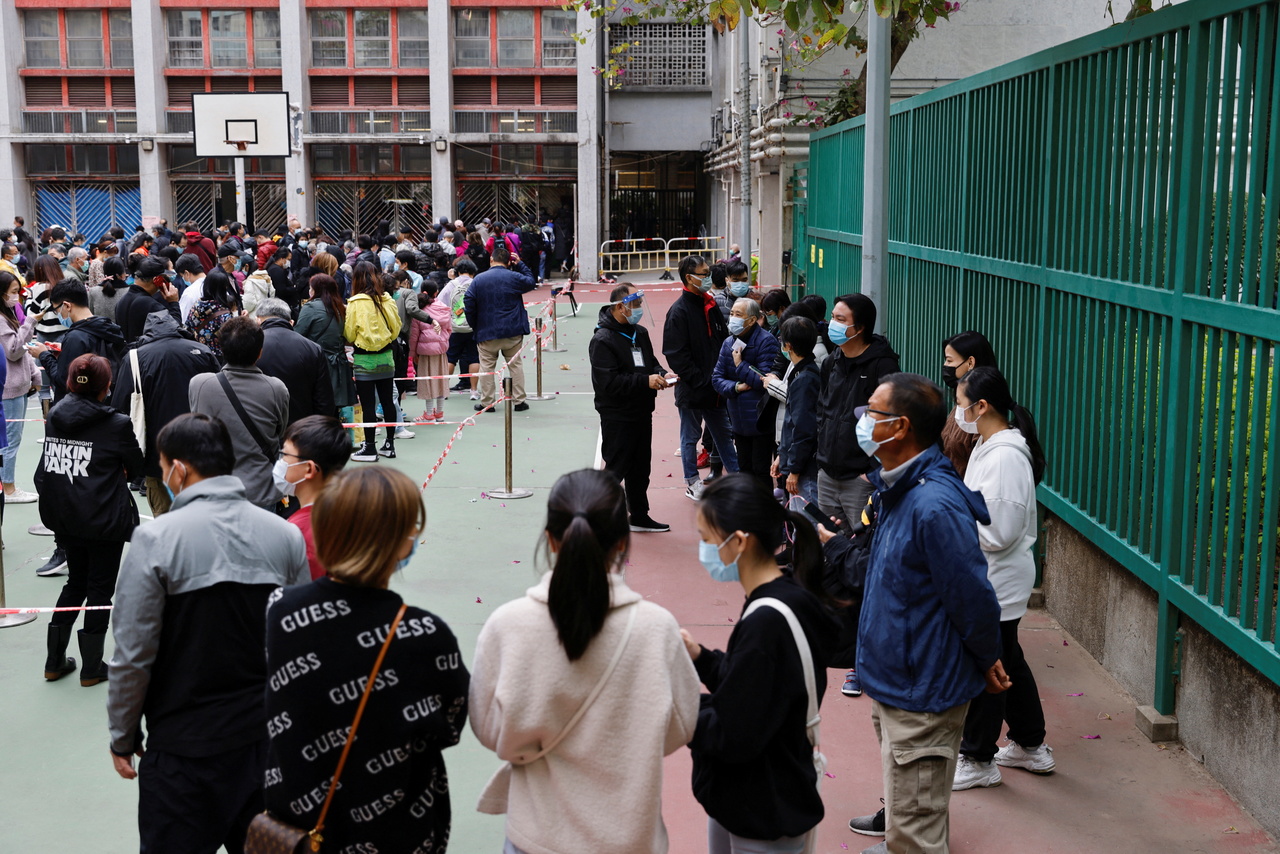Hong Kong locks down building and tests thousands as Covid-19 cases jump
Sign up now: Get insights on Asia's fast-moving developments

People queueing for Covid-19 tests at a community testing centre in Hong Kong on Jan 12, 2022.
PHOTO: REUTERS
HONG KONG (BLOOMBERG) - A rising number of Covid-19 infections in Hong Kong, known for its zealous Covid-zero approach, is unnerving the city's political and healthcare leaders.
Local cases, while comparatively low, are hitting levels not seen in nearly a year. There are several undetectable chains of transmission.
Some infections appear to be coming from unusual sources - including family pets and a scavenger who recycles items from apartment buildings - showing how difficult it will be to keep the highly transmissible strains at bay.
It has been more than three weeks since there were no local cases and daily counts are growing. After just three local infections last Friday, there were 10 on Thursday (Jan 20) - plus another 20 preliminary positive tests, with most transmitted locally.
The government is drilling down deeply, trying to track every case.
The outbreak in a public housing estate and signs of virus found in sewage led to mass testing at dozens of apartment blocks, involving thousands of people.
Officials ordered residents at a public housing building in the New Territories into three days of restrictions, with more than 2,500 residents required to undergo daily Covid-19 testing and can leave the building only after getting a negative result.
The lockdown order came after 13 preliminary cases emerged within one day at the estate, in addition to three confirmed Omicron infections. Those involved are 15 residents and a guard, who likely spread the virus more widely into common areas such as lifts while on patrol.
The affected residents live in 12 units, across 11 floors and facing 10 different directions, the government said, offering no plausible sign of environmental spread.
The authorities now suspect a man who was infected visited numerous rubbish collection areas to gather items to recycle or resell, creating a potential superspreader event that seeded the virus throughout the building.
Ordering three consecutive nights of a snap lockdown is a compromise to the government's typical approach, which is to send everyone considered a close contact or high risk to city-run quarantine facilities. Those locations could not handle a sudden influx of thousands of people, health leaders said.
On Thursday, after a handful of confirmed and preliminary cases reported involved students, the authorities announced the suspension of in-person secondary school classes starting on Monday. This follows the closure of primary schools and kindergartens last week.
Meanwhile, health workers also found more cases related to pet shops, after the government ordered 2,000 animals to be destroyed based on the suspicion that imported hamsters could be a source of the latest flare-up of the Delta infection.
Two more customers tested positive for Covid-19 after visiting different pet shops, and another sample from a hamster cage generated a positive result in yet another location.
Officials said they were more confident about the possibility that pet hamsters are spreading the virus in the city as the newly uncovered infections were genetically distinct from the strain initially found in a pet shop clerk.
The city's top virus expert warned that one set of infections tied to hamsters may contain a novel mutation known as D427G, justifying an urgent effort to contain it that includes the culling of thousands of pets.
"We do not know the transmissibility or virulence of this mutant. The safest way is to sacrifice the hamsters to stop the outbreak of the Delta virus strain, which may come from the hamsters," said Professor Yuen Kwok Yung, a world-renowned microbiologist who advises the government, in a press release late on Thursday evening explaining the need to cull the animals.
"We have good reason to believe that animal-to-human transmission is very likely, and pet stores have seen second-generation transmission."
He added: "Faced with these multiple unknowns, if the community spread of the mutated virus is not stopped soon, it could spread across Hong Kong, the mainland and overseas, leading to another disaster."


